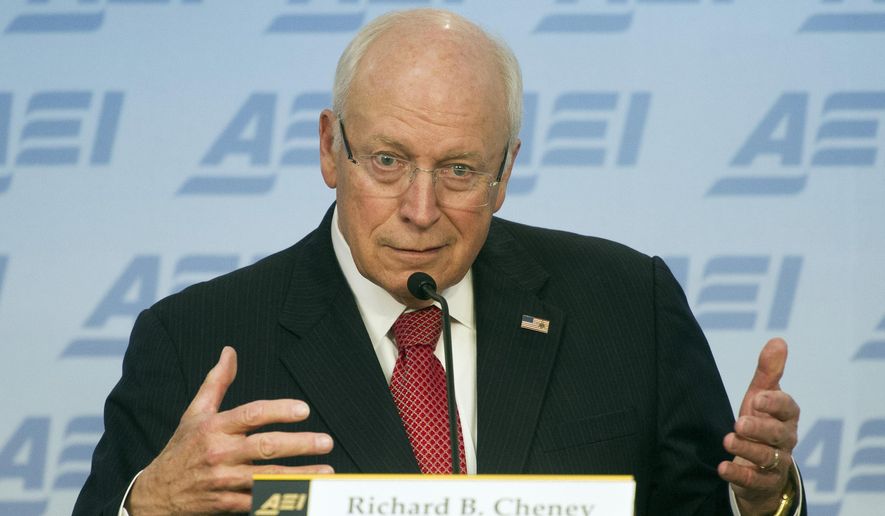Former Vice President Dick Cheney said Sunday that in spite of the backlash from a recent Senate report and innocent men supposedly being imprisoned, he would authorize CIA interrogation tactics again with no hesitation.
“It worked. It’s worked now for 13 years. We’ve avoided another mass-casualty event against the United States,” he said on “Meet the Press.” “I’d do it again in a minute.”
The Senate released a report last week that described interrogation tactics including waterboarding, sleep deprivation, rectal feedings and confinement in a coffin-sized box for more than a week. Many call the actions torture that violate international agreements and put U.S. troops in jeopardy of similar treatment if taken captive.
Mr. Cheney maintained that the administration consulted with lawyers at the time and made sure not to cross that line. He also contemptuously dismissed fears of retaliation, saying that an American captured by the Islamic State is “not likely to be waterboarded; he’s likely to have his head cut off. It’s not a close call.”
Democrats have condemned the actions in the report, but Jose Rodriguez, a former chief of the CIA National Clandestine Service, said some, including House Minority Leader Nancy Pelosi, knew about the interrogation techniques as far back as 2002.
“I briefed her on all of the techniques. These people were fully aware of all of the techniques approved by the Department of Justice and legal counsels,” he said on “Fox News Sunday. “She never objected to the techniques at all.”
He said many members of Congress told CIA officials that they were being too careful and needed to do more to protect the country.
The Senate report found that 26 of the 119 men detained by the CIA did not meet the criteria to be imprisoned or interrogated.
But just because someone didn’t meet the criteria to be detained doesn’t mean that person wasn’t a member of a terrorist organization or a threat to Americans, former CIA Director Michael V. Hayden said on ABC’s “This Week” program.
Asked specifically about an innocent man who froze to death in CIA custody, Mr. Cheney said he was more concerned with the men who were released and returned to the battlefield than the minority of innocent men who were harmed.
“I have no problem as long as we achieve our objective, which is to get the guys who caused 9/11 and to protect the United States,” he said.
Karl Rove, who served as a top aide to President George W. Bush, criticized Senate Democrats for not interviewing any top CIA officials to compile their report.
He also said the report contains factual errors, such as a statement that Mr. Bush didn’t know about the interrogation tactics until 2006. Mr. Rove said Mr. Bush approved the tactics long before that.
“They simply didn’t talk to the people. They talked to no one. They simply read documents. It’s like the Queen of Hearts: Judgment first, verdict second,” he said on “Fox News Sunday.”
Sen. Sheldon Whitehouse, Rhode Island Democrat, said committee members didn’t talk with former top officials or directors for the report because they thought those officials were misleading Congress. Instead, the report focuses on lower-level officials who were in the room where actions or conversations took place.
Mr. Cheney said the report is putting national security in jeopardy by making agents worry that “10 years from now, even though the president approved it and Department of Justice approved it, some lawmaker on Capitol Hill is going to come back and want a piece of your fanny.”
Mr. Rodriguez also said the report puts too much blame on CIA employees and that the country will “pay the price” in the future with hesitation to act because of concern about backlash.
“Leaders at the agency are going to wonder whether the authorities they receive from their president will last longer than one election phase. That’s a big concern,” he said. “We want the CIA to be confident their authorities will not be second-guessed when the administration changes.”
• Jacqueline Klimas can be reached at jklimas@washingtontimes.com.




Please read our comment policy before commenting.